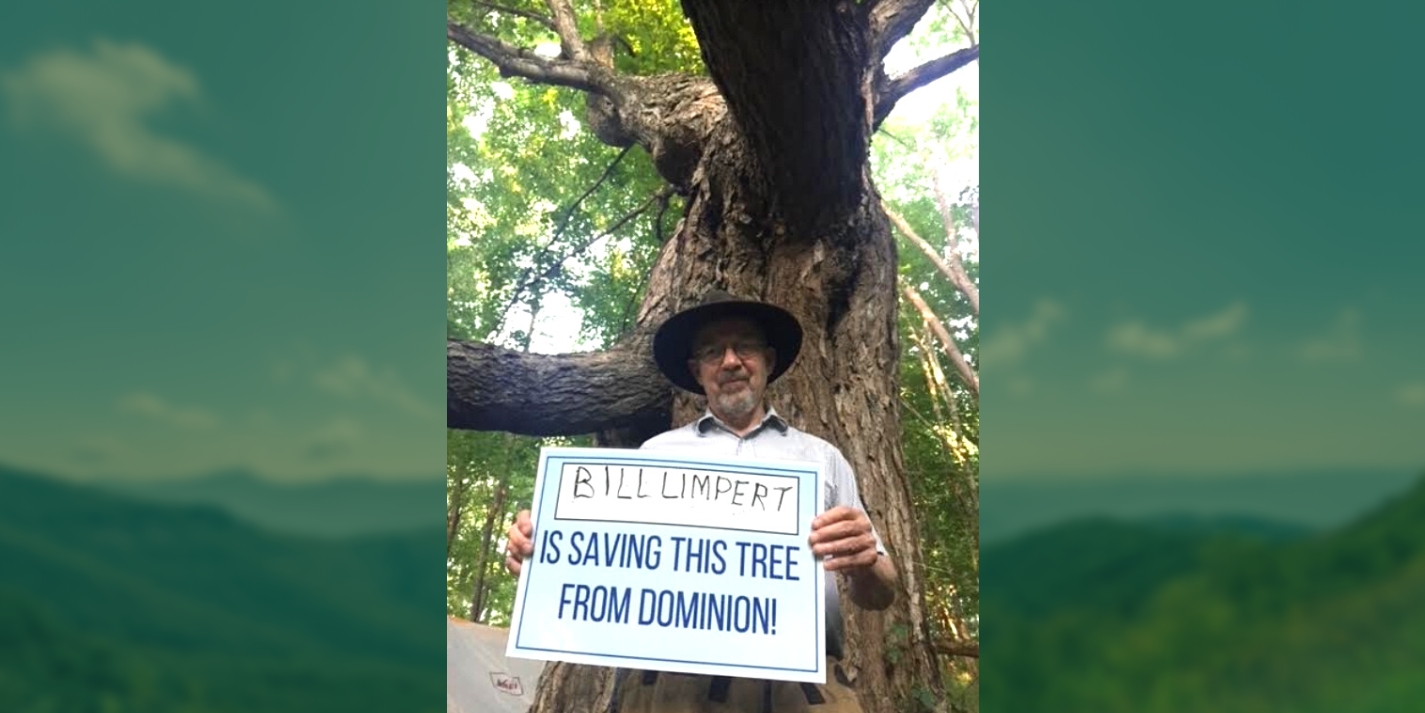By Mike Tidwell
The first time I met Bill Limpert he was 71 years old and standing outside the Virginia General Assembly in Richmond. He was holding a photograph of a 300-year old tree, a sugar maple, one of the biggest trees I’d ever seen. Dominion Energy, Bill said that spring of 2018, wanted to cut the tree down for the Atlantic Coast Pipeline. And not just that one. The company was planning to chainsaw hundreds of hardwoods like it on his mountainous Bath County property, trees between 300-400 years old, the largest tract of truly ancient hardwoods in all of Virginia.
“I don’t intend to let it happen,” Bill said. “I’m no spring chicken but I have every intention of stopping this pipeline and outliving the fossil fuel era.”
Bill did stop the pipeline, giving tours of his land to reporters, raising awareness across the state, and joining thousands of other activists and authorities — land owners, retired teachers, lawyers, green advocates, federal judges, high school kids — who forced Dominion to cancel in 2020 its $8 billion, 600-mile abomination for shipping fracked gas from West Virginia to North Carolina.
But sadly Bill’s second dream did not come true. Bill passed away on February 5th in Maryland, where he had moved to take care of his aging mother. He did not live to see the end of the fossil fuel era. The cause of death was blood cancer. He was 76.
This soft-spoken ACP fighter, who played guitar on his Bath County porch when he wasn’t sending detailed maps and memos to government regulators to further complicate Dominion’s life, has moved on from this world – a world he made better for the rest of us.
Someone has said that the fight to stop the ACP was so close, requiring so much effort, that the absence of any one activist might have meant Dominion got its way. Whether Bill — and his equally heroic wife Lynn who survives him — made the final difference, I do not know.
What I do know is that Bill inspired me as much as anyone I know from that pipeline fight. The first time I visited his modest home in Bolar, Virginia, up a gnarly dirt road at nearly 3,000 feet, he showed me the paw print that a bear had left the night before on the side of his house. Then he showed me a slew of ground-level photographs taken on his property. He was poring over them, looking for that one endangered rusty-patched bumble bee that would further endanger Dominion’s pipeline. (He later found one.)
Bill and Lynn had arrived here only seven years earlier, moving down from their previous mountain home in western Maryland. They were, in the local parlance, “come heres” not “from heres.” But they defended this land as if they had been here all their lives.
The crown jewel of that land was a 3,000-foot-long ridge that locals called “Miracle Ridge.” It was steep-sided and populated, like the surrounding land, with stunningly old red oaks, sugar maples, basswoods, hickory oaks and more. A state conservation expert had said there was no other continuous stand of trees this old in all of Virginia, not even in Shenandoah National Park.
After Dominion sent a letter in 2015 saying it planned to seize the ridge through eminent domain and destroy it, the Limperts invited people to see the trees and Miracle Ridge for themselves. People came, from all over the state, some arriving by the dozens in organized caravans.
Then Bill would put on his old leather chaps and his worn-out hat and grab his hiking stick and give walking tours. After 30 minutes among the ancient trees, he would stop at the crest of Miracle Ridge and explain that Dominion wanted to literally decapitate the entire ridge. The company would use winches and chains to lower bull dozers down from nearby Jack Mountain and then scrape away the equivalent of a two-story building from the entire top of the ridge. In total, across West Virginia and Virginia, the pipeline would decapitate 38 miles of ridges like this.
In the summer of 2018, when Dominion’s bulldozers and chainsaws seemed imminent, Bill and Lynn invited activists from across the region to set up a continuous protest camp on their land. From June to October we arrived in a steady flow, our tents spread among the mighty trees, ready to peacefully resist with our bodies if the worst ever came. Blessedly, the bulldozers never arrived. Court victories and grassroots pressure were crippling the pipeline. Instead that summer, we held trainings on the art of civil disobedience and enjoyed Lynn’s vegetarian chili and spent many nights savoring the bluegrass music of local players on the Limpert porch.
Bill lived to see the pipeline cancelled on July 5th, 2020, a day none of us will forget. He then went on to fight the ACP’s evil twin, the Mountain Valley Pipeline, till just months before his death. I’m glad Bill saw, too, the passage of the Virginia Clean Economy Act in Richmond and the Inflation Reduction Act on Capitol Hill. Both bills are hastening the day, not that far away, when wind farms and solar energy and electric cars bring definitive closure to the fossil fuel era.
And while Bill didn’t live to see that era end, the old trees on his property – now set to become a conservation easement – will see it. Many of those trees started life as forest seedlings in the early 1700s, before the start of the fossil fuel era. And many will be here, thanks to Bill, when it is no more.
Mike Tidwell is the executive director of the Chesapeake Climate Action Network

